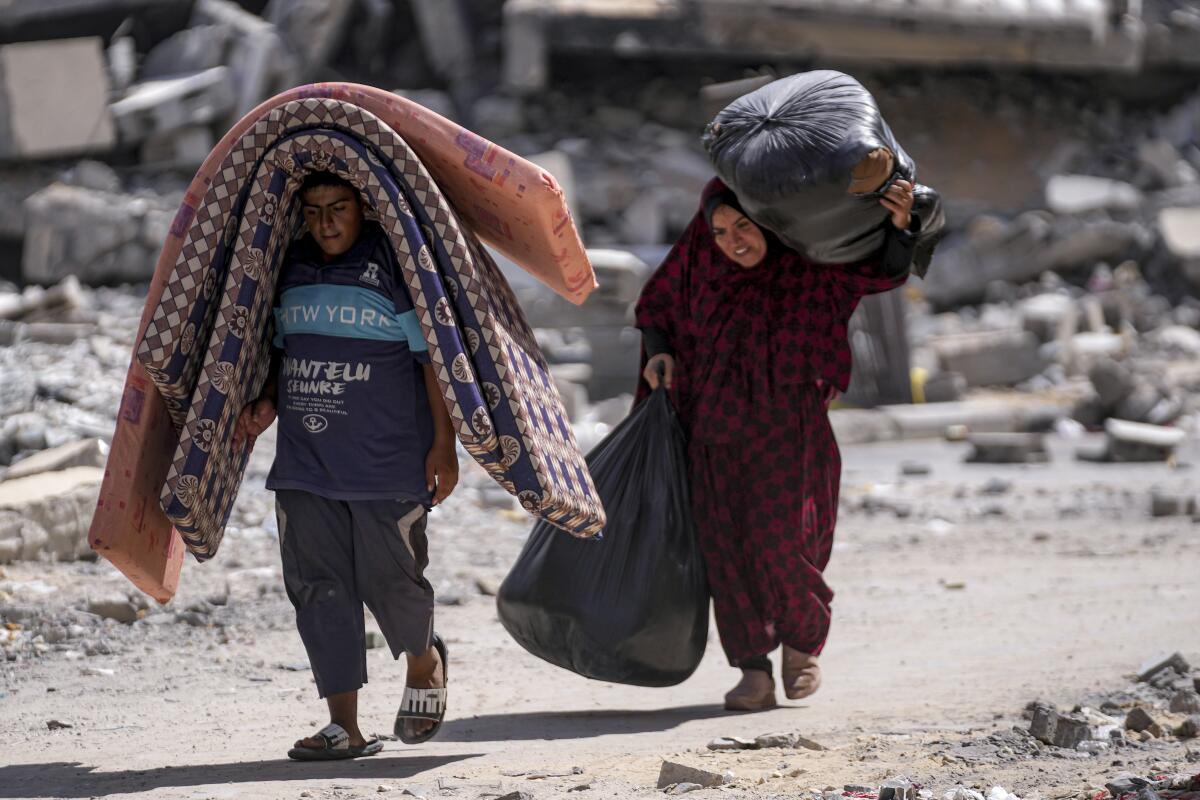Israel widens evacuation orders in southern Gaza after deadly strike on school-turned-shelter

DEIR AL BALAH, Gaza Strip — The Israeli military ordered more evacuations in southern Gaza early Sunday, a day after a deadly airstrike on a school-turned-shelter in the north killed at least 80 Palestinians, according to local health authorities. The airstrike was one of the deadliest attacks in the 10-month war.
Israel has repeatedly ordered mass evacuations as its troops return to heavily destroyed areas where they previously battled Palestinian militants. The vast majority of Gaza’s population of 2.3 million people have been displaced, often multiple times, in the besieged territory 25 miles long by about 7 miles wide.
The latest evacuation orders apply to areas of Khan Yunis, Gaza’s second-largest city, including part of an Israeli-declared humanitarian zone from which the military said rockets had been fired. Israel accuses Hamas and other militants of hiding among civilians and launching attacks from residential areas.
Cardiologist and Palestinian moderate Mustafa Barghouti tries to drum up support on Capitol Hill, California for the Palestinian cause.
The humanitarian zone has steadily shrunk during the war with the various evacuation orders. Hundreds of thousands of people have crammed into squalid tent camps with few public services or sought shelter in schools, though the United Nations says hundreds of those have been directly hit or damaged.
Khan Yunis suffered widespread destruction during an air and ground offensive earlier this year. Tens of thousands fled again last week after an evacuation order.
The new order came in leaflets dropped from the sky. As smoke rose on the horizon, hundreds of families carrying belongings in their arms left homes and shelters, seeking elusive refuge. One child carried a stuffed Hello Kitty doll as others walked through rubble-filled streets.
“We don’t know where to go,” said Amal Abu Yahia, a mother of three, who had returned to Khan Yunis in June to shelter in their severely damaged home. It was the fourth displacement for the 42-year-old widow, whose husband was killed when an Israeli airstrike hit their neighbors’ house in March.
She said they went to Muwasi, a sprawling tent camp along the coast, but couldn’t find space.
Ramadan Issa, a father of five in his 50s, fled Khan Yunis with 17 members of his extended family, joining hundreds of people walking toward central Gaza.
“Every time we settle in one place and build tents for women and children, the occupation comes and bombs the area,” he said, referring to Israel. “This situation is unbearable.”
Gaza’s Health Ministry, which doesn’t distinguish between civilians and combatants, says the Palestinian death toll from the war is approaching 40,000. Aid groups have struggled to address the staggering humanitarian crisis, while international experts have warned of famine.
The war began when Hamas-led militants burst through Israel’s defenses on Oct. 7 and rampaged through farming communities and army bases near the border, killing around 1,200 people — mostly civilians — and abducting around 250 people.
The United States, Egypt and Qatar have spent months trying to mediate a cease-fire and the return of the roughly 110 remaining hostages, around a third of whom Israeli authorities believe to be dead. Talks were due to resume Thursday.
The conflict has threatened to trigger a regional war, as Israel has traded fire with Iran and its militant allies across the region.
In the occupied West Bank, which has seen increased violence since the war began, Israel’s military said that a Israeli civilian was fatally shot in an attack by “terrorists” in the area of Mehola Junction. The military said “terrorists” opened fire from a passing vehicle at other cars, and another civilian was wounded. Soldiers were pursuing the attackers.
Sometimes in Gaza it feels like a cigarette is the only thing that might help. But even that is out of reach.
Israel’s airstrike on Saturday hit a mosque inside a school in Gaza City where thousands of people were sheltering. The Gaza Health Ministry said 80 were killed and around 50 others wounded during morning prayers. The Israeli military said it killed 19 Hamas and Islamic Jihad militants. Hamas and Palestinian activists disputed that, saying two of the 19 had been killed in earlier strikes, and others were known to be civilians or opponents of Hamas.
Gaza City and the rest of the north have been surrounded by Israeli forces and largely cut off from the world, and it wasn’t possible to independently confirm the accounts from either side.
The U.N. human rights office says Israel has carried out “systematic attacks on schools,” which have served as shelters since the start of the war, with at least 21 hit since July 4, leaving hundreds of people dead, including women and children.
European leaders and neighbors of Israel condemned the strike, while the U.S. said that it was concerned about the reports of civilian casualties. “Yet again, far too many civilians have been killed,” Vice President Kamala Harris told reporters.
“We need a hostage deal and we need a cease-fire,” she said. “The deal needs to get done and it needs to get done now.”
Shurafa and Magdy write for the Associated Press. Magdy reported from Cairo.
More to Read
Sign up for Essential California
The most important California stories and recommendations in your inbox every morning.
You may occasionally receive promotional content from the Los Angeles Times.












